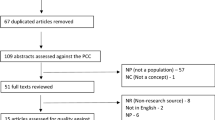Abstract
Family caregiving involves the provision of care by family members and self-care by patients, with the two groups participating together in illness-related care. A convenience sample of 100 patients and 100 unrelated family caregivers were surveyed to examine their perceptions of the caregiving skills they perform, the difficulty they experience in performing certain skills, and their associated learning needs. Descriptive analysis of data revealed differences in the type of activities patients and caregivers perform, the perceived difficulty of caregiving tasks, and their need for assistance. Uncertainty about disease stage poses important implications for educators.
Similar content being viewed by others
References
Pasacreta JV, Barg F, Nuamah I et al (2000) Participant characteristics before and 4 months after attendance at a family caregiver cancer education program. Cancer Nurs 23:295–303
National Cancer Institute (2004) About Survivorship Research: Survivorship Definitions [Online]. Available: http://dccps.nci.nih.gov/ocs/definitions.html
Schumacher KL, Beidler SM, Beeber AS et al (2006) A transactional model of cancer family caregiving skill. Adv Nurs Sci 29(3):271–286
Archbold PG, Stewart BJ, Greenlick MR et al (1990) Mutuality and preparedness as predictors of caregiver role strain. Res Nurs Health 13:375–384
Schumacher KL, Stewart BJ, Archbold PG et al (2008) Effects of caregiving demand, mutuality, and preparedness on family caregiver outcomes during cancer treatment. Oncol Nurs Forum 35(1):49–56
National Alliance for Caregiving (NAC), American Association of Retired Persons. Caregiving in the U.S. 2004 Apr. http://www.caregiving.org/data/o4finalreport.pdf
Farran CJ (2001) Family caregiver intervention research: where have we been? where are we going? J Gerontol Nurs 27(7):38–45
Teel CS, Leenerts MH (2005) Developing and testing a self-care intervention for older adults in caregiving roles. Nurs Res 54(3):193–120
Heller T, Caldwell J (2006) Supporting aging caregivers and adults with developmental disabilities in future planning. Ment Retard 44(3):189–202
Wofford JL, Smith ED, Miller DP (2005) The multimedia computer for office-based patient education: a systematic review. Patient Educ Couns 59:148–157
Acknowledgements
The authors thank Dr. Judith Headley for her assistance in data analysis and interpretation.
Author information
Authors and Affiliations
Corresponding author
Rights and permissions
About this article
Cite this article
Potter, P., Deshields, T., Kuhrik, M. et al. An Analysis of Educational and Learning Needs of Cancer Patients and Unrelated Family Caregivers. J Canc Educ 25, 538–542 (2010). https://doi.org/10.1007/s13187-010-0076-z
Published:
Issue Date:
DOI: https://doi.org/10.1007/s13187-010-0076-z



